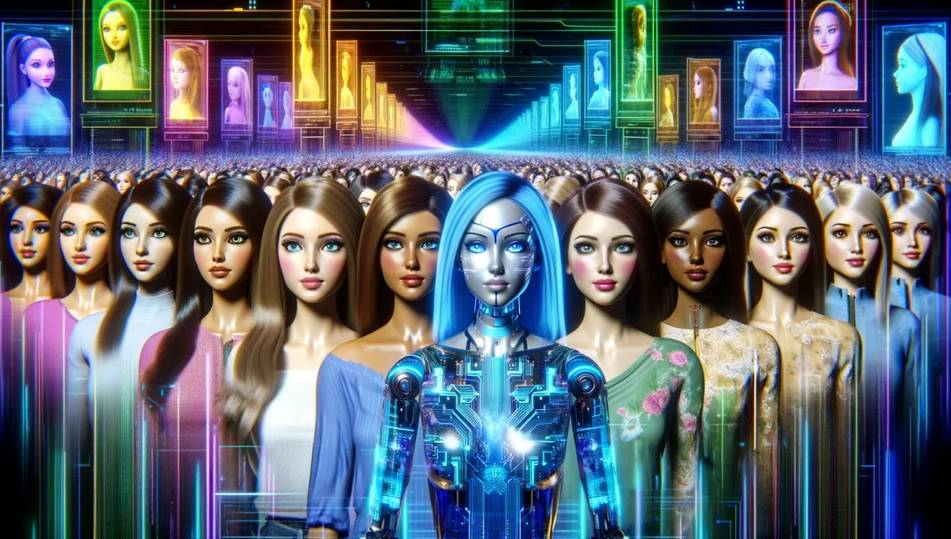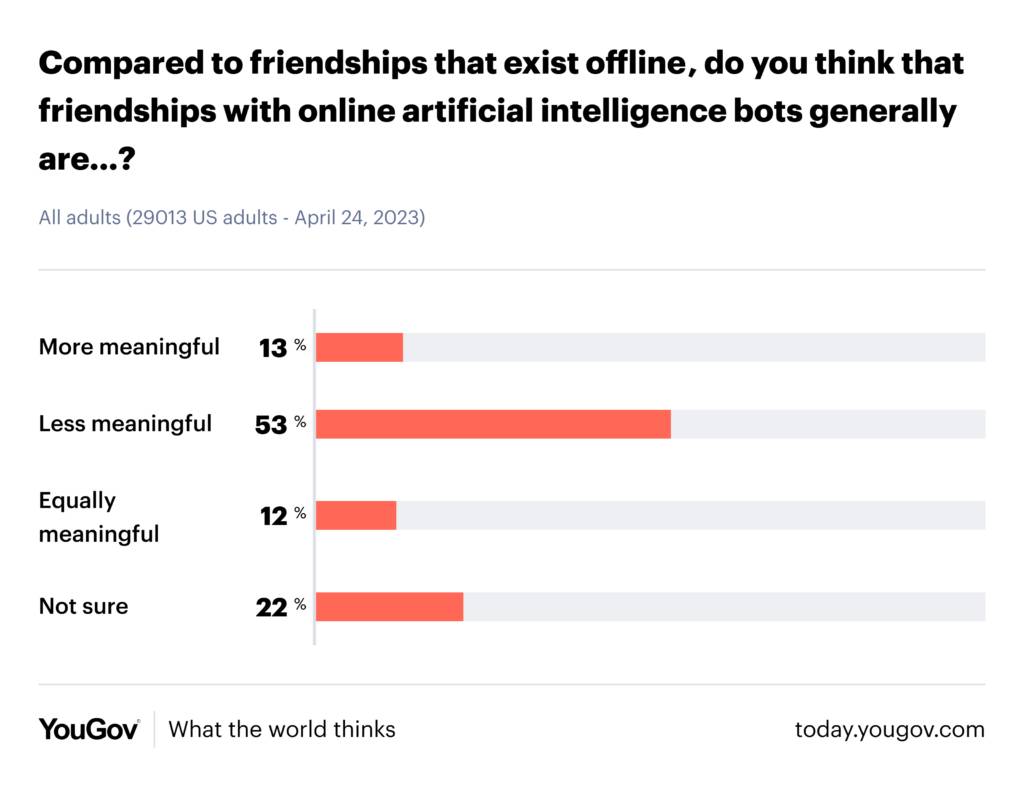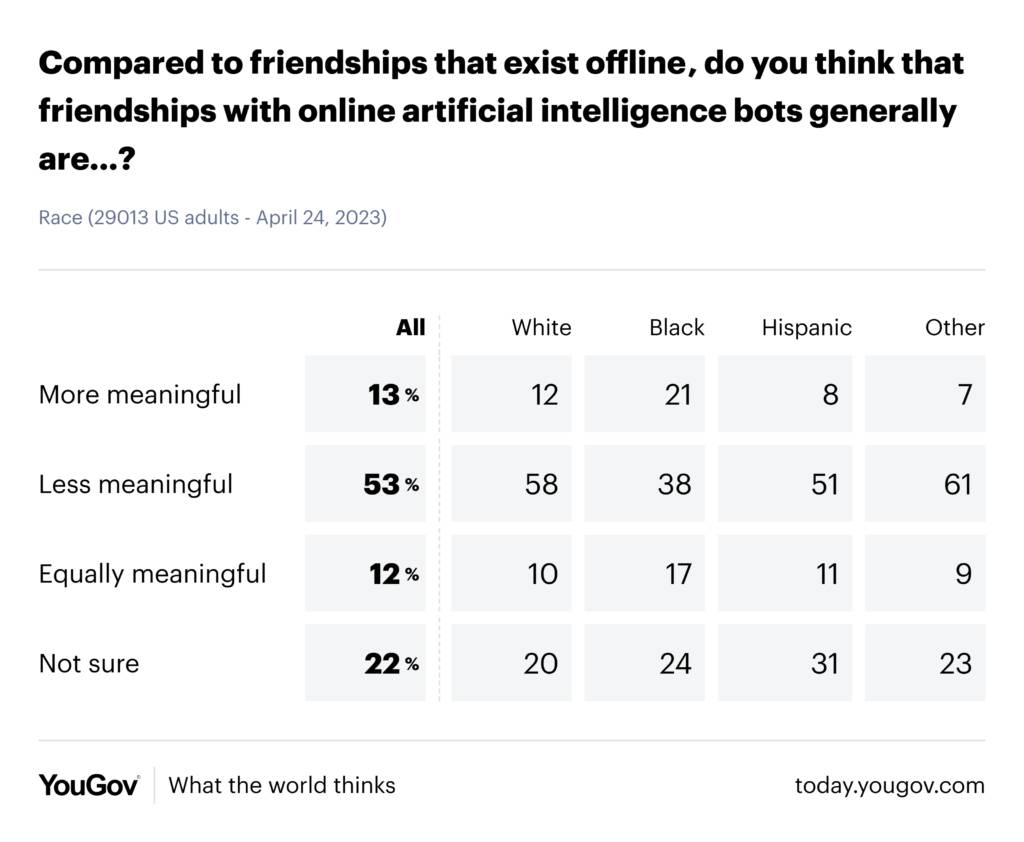The Institute for Family Studies recently conducted a survey, in collaboration with YouGov, which found that one in four young adults in the United States thinks artificial intelligence (AI) "lovers" could eventually replace real romantic relationships. The survey included responses from 2,000 Americans under the age of 40 and has sparked much discussion, with media outlets such as the New York Post expressing concern about the impact of AI on personal relationships. But how much do these statistics actually say about people's attitudes toward AI companions?
> Read the original post here <
Despite 25% of respondents indicating that AI could replace real relationships, only 10% said they would consider having an AI boyfriend or girlfriend, and only 1% of participants actually had one. Among those who were unmarried or living together, only 7% showed interest in AI relationships. Interestingly, the survey also showed that 21% of respondents classified as frequent porn users were more inclined to the idea of an AI relationship. The striking headline that a quarter of young adults support AI relationships loses its impact when we consider that only 1% of them have had experience with an AI friend.
Position | AI Generator | Description | Reviews |
1. | Unique site. Create your own dream girlfriend. | ||
2. | Huge number of options and beautiful site design. | ||
3. | Cheap. You get a lot for your money. | ||
4. | Popular and very powerful AI generator | ||
5. | One of the oldest and best AI generators | Read the review |
Although the "one in four" statistic has attracted attention, AI lovers still seem to appeal only to a niche audience, even if they are part of a growing trend. On the other hand, the finding that only 1% of adults under 40 have an AI friend does not seem to agree with other studies. For example, an MIT study from July 2023 revealed that sexual role-playing games were the second most popular application of ChatGPT right after creative writing, despite such activities being against ChatGPT's terms of use.
Perhaps not the full truth
In addition, the success of AI friend apps tells a different story. Replika, a well-known AI app, reached 30 million users in August 2023. Even if only a third of these users were American, that figure would far exceed 1% of the adult population under 40. Character.ai, another prominent AI chat bot service, has similar numbers, suggesting that AI loves are more widespread than the survey suggests.
In short, the Institute for Family Studies' study appears to have limited credibility, as it is based on a small sample size and a headline ostensibly designed to incite fear. This story plays to the conservative think tank behind the study, allowing them to fuel fears that young adults are trading real relationships for AI-driven alternatives.
YouGov's 2023 survey on public views on AI friendships
A separate and larger survey by YouGov, conducted in April 2023 without the involvement of the Institute for Family Studies, surveyed more than 29,000 American adults. The results were even more remarkable: 24% of young Americans between 18 and 29 said they found AI friendships more meaningful than human friendships, while another 22% found them equally meaningful. In total, nearly 46% of young Americans felt that AI friendships were at least as meaningful as friendships with real people.
This survey also highlighted several demographic differences, including age, gender, race and political affiliations. Among male respondents, 16% considered AI friendships more meaningful compared to only 10% of female respondents. Moreover, black Americans were almost twice as likely as white Americans to believe that AI friendships were as meaningful or more meaningful than human relationships.
Considerable contradictions
Comparing the two surveys reveals significant contrasts. While the more recent survey found that only 10% of young Americans were open to having an AI friend, the earlier 2023 survey indicated that nearly half believed AI friendships could be as meaningful as human relationships. These contradictions may be influenced by media approaches or biases in the newer survey, especially given the involvement of a conservative organization. Ultimately, more unbiased research is needed to better understand public attitudes toward AI companions and how people interact with them.




